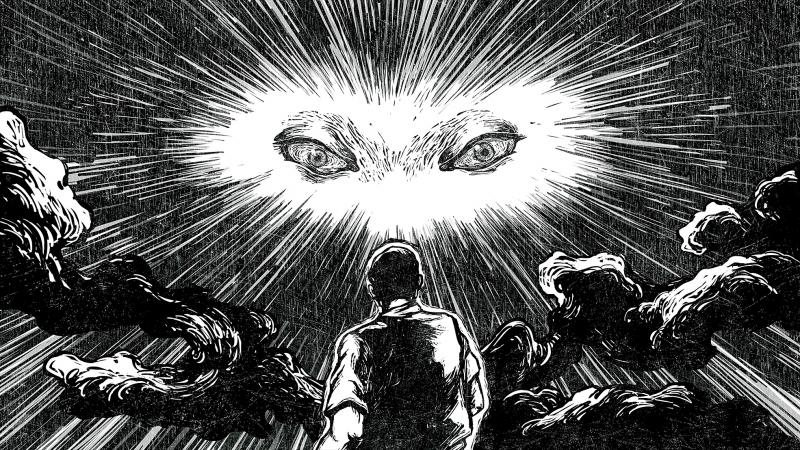As Taiwan continues to reclaim its suppressed past, there’s been a proliferation of documentaries on notable writers — in this case the legendary author and critic Yeh Shi-tao (葉石濤) — in a bid to bring them back to the national consciousness, especially among young people.
Born in Tainan in 1925, Yeh showed his genius from a young age, publishing his first novel as a teenager. Things went south for him after World War II; as a member of the “translingual generation” he was forced to compose in an unfamiliar language — Mandarin. Additionally, he was thrown in jail for three years 1951 for “harboring communists” during White Terror era.
The ensuing decade was a dark one for Yeh as he struggled to make ends meet after his release, but once he picked up the pen again in 1964, it was full steam ahead until his death in 2008. In addition to depicting the lives of everyday Taiwanese, he was also a sharp literary critic and completed the History of Taiwanese Literature (台灣文學史綱) during a time when local works were still not valued by the government or most scholars.

Photo courtesy of Wonder Woods Films
Born in the same year as Taoyuan’s Chung Chao-cheng (鍾肇政), an exemplar of Taiwan’s “nativist literature movement,” the two are often referred together as “Chung of the North, Yeh of the South, 北鍾南葉).
Yeh Shih-tao, A Taiwan Man (台灣男子葉石濤) eschews a linear approach, instead it pieces together Yeh’s life through extensive interviews with more than a dozen friends and family members, and re-interprets his work through modern dance, drama and woodblock-style animations. It’s very ambitious of director Hsu Hui-lin (許卉林) to include so many productions within her production, and the result pays off. The narrative still drifts in a generally chronological direction, so it’s not too confusing.
The film immediately draws in the viewers during the opening scene, with Yeh (played by an actor) sitting at his desk writing, while dancers in pig masks prance around the minimalist stage. They are acting out a scene from his short story Spring Dream at Gourd Alley (葫蘆巷春夢), where a quaint, tiny alley was turned into a smelly, chaotic dump after an old man started a pig-raising craze among the residents. As Yeh continues to narrate the tale, one of the dancers walks over and crams the pig mask over his head.

Photo courtesy of Wonder Woods Films
Other memorable performances include a four-person dance troupe interpreting a violent White Terror arrest scene from The Red Shoes (紅鞋子), while the mostly subdued tones of the film suddenly turn warm and lush as a nude woman sensually gyrates by the beach to encapsulate the mother earth-like sexuality in The Last of the Siraya (西拉雅族的末裔).
These vivid modern interpretations provide a fresh and creative way to tell Yeh’s remarkable life story, but the meat of the information still comes from the interviews.
The most valuable parts are the insights into Yeh’s character and private life, painting a well-rounded picture of this warm, determined character who was so immersed in his craft and mission that he did not know how to do a lot of basic things such as load a stapler. This succession of talking heads gets tedious at times, and there could be more creative scenes to break the monotony — but overall, the film really brings Yeh to life despite him only briefly appearing in old footage. Even those who haven’t read his work should walk out of the theater with a general understanding of what Yeh was trying to express.
One interesting decision is that even though Yeh mostly wrote in Mandarin, his writings are mostly read aloud in his native Hoklo (commonly known as Taiwanese). This can’t be done character-for-character in a meaningful way, and as a result, what’s being read is not Yeh’s original prose, but again a modern-day interpretation of it. Is this taking too much liberty with a deceased master’s work without his permission, or returning his long-denied right to compose in his mother tongue? It’s hard to say.

June 2 to June 8 Taiwan’s woodcutters believe that if they see even one speck of red in their cooked rice, no matter how small, an accident is going to happen. Peng Chin-tian (彭錦田) swears that this has proven to be true at every stop during his decades-long career in the logging industry. Along with mining, timber harvesting was once considered the most dangerous profession in Taiwan. Not only were mishaps common during all stages of processing, it was difficult to transport the injured to get medical treatment. Many died during the arduous journey. Peng recounts some of his accidents in

“Why does Taiwan identity decline?”a group of researchers lead by University of Nevada political scientist Austin Wang (王宏恩) asked in a recent paper. After all, it is not difficult to explain the rise in Taiwanese identity after the early 1990s. But no model predicted its decline during the 2016-2018 period, they say. After testing various alternative explanations, Wang et al argue that the fall-off in Taiwanese identity during that period is related to voter hedging based on the performance of the Democratic Progressive Party (DPP). Since the DPP is perceived as the guardian of Taiwan identity, when it performs well,

The Taiwan People’s Party (TPP) on May 18 held a rally in Taichung to mark the anniversary of President William Lai’s (賴清德) inauguration on May 20. The title of the rally could be loosely translated to “May 18 recall fraudulent goods” (518退貨ㄌㄨㄚˋ!). Unlike in English, where the terms are the same, “recall” (退貨) in this context refers to product recalls due to damaged, defective or fraudulent merchandise, not the political recalls (罷免) currently dominating the headlines. I attended the rally to determine if the impression was correct that the TPP under party Chairman Huang Kuo-Chang (黃國昌) had little of a

At Computex 2025, Nvidia CEO Jensen Huang (黃仁勳) urged the government to subsidize AI. “All schools in Taiwan must integrate AI into their curricula,” he declared. A few months earlier, he said, “If I were a student today, I’d immediately start using tools like ChatGPT, Gemini Pro and Grok to learn, write and accelerate my thinking.” Huang sees the AI-bullet train leaving the station. And as one of its drivers, he’s worried about youth not getting on board — bad for their careers, and bad for his workforce. As a semiconductor supply-chain powerhouse and AI hub wannabe, Taiwan is seeing